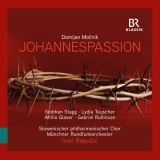Mit dem Requiem von Igor Kuljeric hatte Ivan Repusic 2020 einen echten Coup gelandet und vollkommen zurecht bei den International Classical Music Awards 2021 den Preis in der Kategorie ‘Chormusik’ gewonnen.
Nun legt der Dirigent des Münchner Rundfunkorchesters nach und präsentiert die Johannespassion von Damijan Mocnik aus dem Jahr 2011. Der slowenische Komponist hat den Mut, sich nach den großen Meistern der Musikgeschichte – allen voran J. S. Bach – mit diesem Stoff musikalisch auseinanderzusetzen. Er tut das in einer zugänglichen Musiksprache, die immer wieder auf gregorianische Elemente zurückgreift, aber alles andere als altbacken wirkt. So hat er die tragende Rolle des Erzählers einer Frauenstimme zugeordnet, und Shiobhan Stagg als Historicus trägt die ganze Erzählung mit Einfühlungsvermögen, mit Gespür für Dramatik und Rhetorik und bleibt dabei stets stimmlich klar, singt nie affektiert.
Ohnehin ist diese Passion als eine schlichte Erzählung mit ungeahnten Folgen angelegt, und so gelingt Ivan Repusic und seinem gesamten Ensemble eine sehr eindringliche Schilderung der Ereignisse – vom Verrat Jesu bis zu dessen Kreuzigung – ohne Durchhänger. Die Interpretation besticht durch die Motorik der Musik, die unaufhaltsam auf das Unvermeidliche zusteuert. Dazwischen setzt Repusic gekonnt kurze dramatische Haltepunkte – gleich zu Beginn mit den Shofar-ähnlichen Klängen, beim Hahnenschrei nach der Verleugnung durch Petrus und natürlich beim Tod am Kreuz.
Ohne Trost entlässt uns das Ensemble aber nicht. Die Schlusssequenz Amor in aeternum setzt die musikalisch passende Fermate hinter diese einfühlsame Passionserzählung aus dem 21. Jahrhundert.
Ivan Repusic scored a real coup in 2020 with the Requiem by Igor Kuljeric, and quite rightly won the prize in the ‘Choral Music’ category at the International Classical Music Awards 2021.
Now the conductor of the Munich Radio Orchestra follows up and presents the St. John Passion by Damijan Mocnik, a work composed in 2011. The Slovenian composer has the courage to musically deal with this theme after the great masters of music history – first and foremost J. S. Bach. He does so in an accessible musical language that repeatedly draws on Gregorian elements, but seems anything but stale. He has assigned the leading role of the narrator to a woman’s voice, and Shiobhan Stagg as Historicus carries the whole narrative with empathy, with a feeling for drama and rhetoric, always remaining vocally clear, never singing affectedly.
In any case, this Passion is designed as a simple narrative with unexpected consequences, and so Ivan Repusic and his entire ensemble succeed in a very vivid portrayal of the events – from Jesus’ betrayal to his crucifixion – without sagging. The interpretation is captivating because of the motoric nature of the music, which moves inexorably toward the inevitable. In between, Repusic skillfully sets short dramatic stops – right at the beginning with the shofar-like sounds, at the cockcrow after Peter’s denial and, of course, at the death on the cross.
But the ensemble does not leave us without consolation. The final sequence Amor in aeternum sets the musically fitting fermata behind this sensitive passion narrative from the 21st century.






















